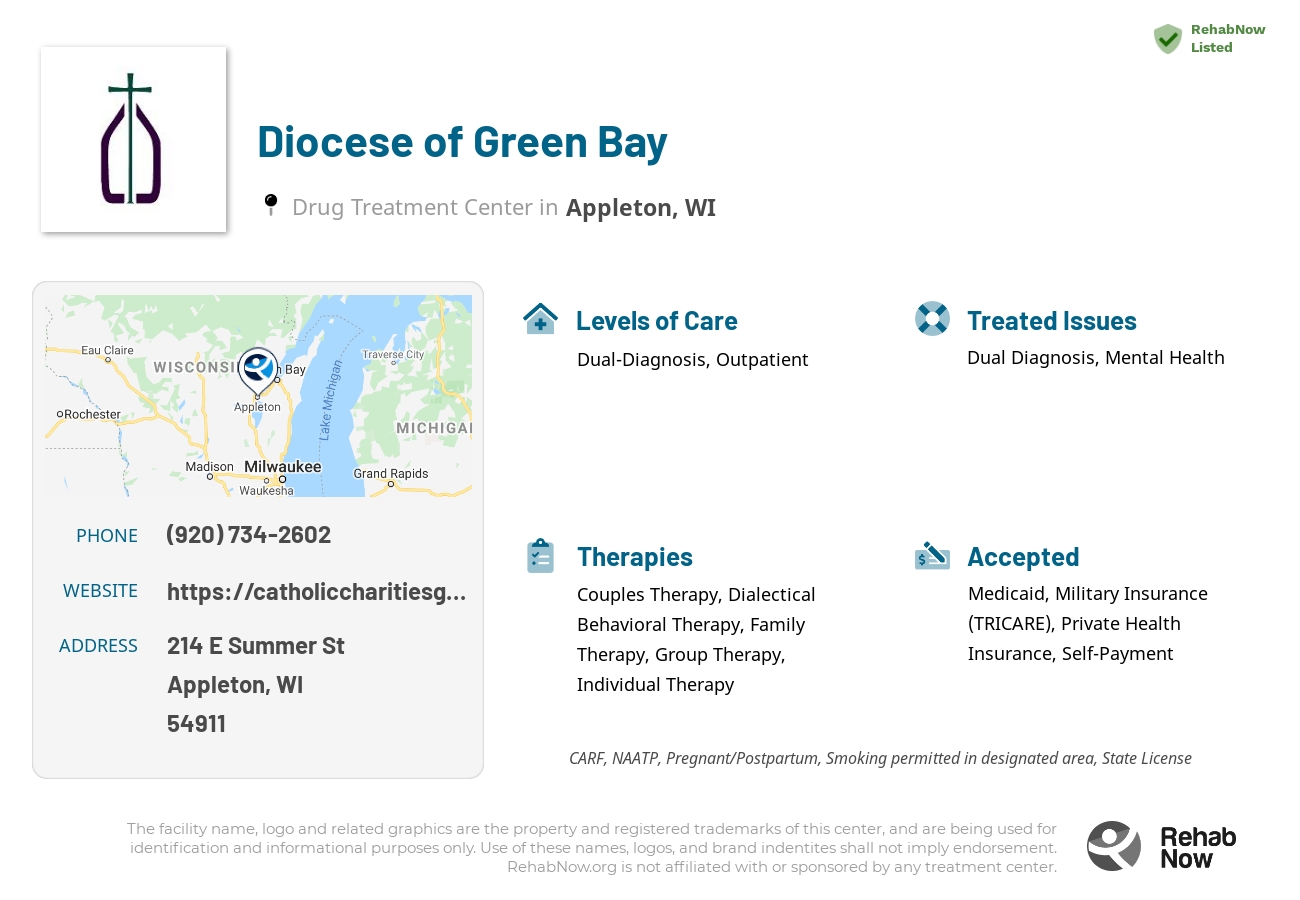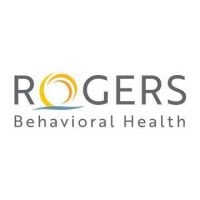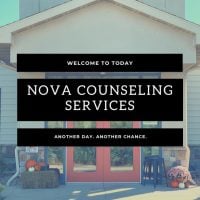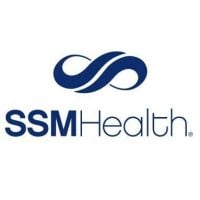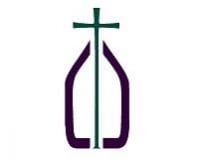
Diocese of Green Bay
Drug Rehab Center in Appleton, Wisconsin
- Mental Health
- Dual Diagnosis
The Diocese of Green Bay is a mental health organization that provides comprehensive and personalized care for individuals, couples and families struggling with mental health and dual-diagnosis issues through cognitive-behavioral approaches and therapy.
About Diocese of Green Bay in Wisconsin
The Diocese of Green Bay is a mental health organization providing dual-diagnostics and outpatient care in the Appleton area since 1918. The Diocese aims to provide comprehensive and personalized care for individuals, couples and families struggling with mental health and dual-diagnosis issues. Treatment focuses on cognitive-behavioral approaches such as Dialectical Behavior Therapy (DBT) and Cognitive Behavioral Therapy (CBT). Clients can also benefit from individual and group therapy, as well as couples therapy.
The mission at Diocese of Green Bay is to promote mental well-being. Private health insurance is accepted and the organization continues to make it easier for clients to access the care they need. The experienced staff at Diocese of Green Bay provide a safe, supportive and healing environment, promoting stability and independence. The goal is to help the clients overcome their mental health issues and recover.
Genders
Ages
Modality
Additional
Conditions and Issues Treated
Dual Diagnosis therapy is considered more successful than traditional rehab methods because it treats the addiction and the underlying mental health disorder simultaneously. This comprehensive approach gives Appleton, WI patients the best chance for long-term recovery. If the patient does not receive treatment for both conditions, they are more likely to relapse.
Levels of Care Offered
This center offers a variety of custom treatment tailored to individual recovery. Currently available are Dual-Diagnosis, Outpatient, with additional therapies available as listed below.
Outpatient treatment consists of counseling and therapy sessions. The outpatient treatment process begins with the addict’s initial detox period, lasting about ten days. Outpatient treatment is used for those who are at moderate risk for “slipping back” into the addiction. It is also used for those who are not currently experiencing any side effects from withdrawal, can handle social pressure, have a stable living environment, and have a good support system.
Therapies & Programs
Individual Therapy is a crucial component of addiction recovery. Therapists work with patients to identify the root of their addiction and figure out how to better handle the issues that led to them using drugs. Individual Therapy is one on one sessions where people meet with their therapist. Individual therapy provides a safe space for people to open up and discuss personal and sensitive topics which they may not feel comfortable discussing in a group setting.
In this type of therapy, therapists can develop specific solutions for each patient, which helps speed up their recovery process. In addiction recovery, therapy is a crucial part. It allows patients to go deep into their core issues and discover how those problems can be better handled now. Therapy can be performed in individual sessions as well as group settings. In individual therapy for addiction, the patient meets with the therapist one-on-one to focus on the underlying issues of addiction and come up with solutions to prevent future abuse.
Addiction can take a heavy toll on relationships, damage the trust and intimacy that was once there. Couples therapy at Diocese of Green Bay helps to rebuild the trust and intimacy that has been damaged. An intimate relationship with a drug addict is not healthy for children or anyone in the family. Therapist help to rebalance family roles and create a healthier environment after rehab in Appleton, WI.
Family therapy is a crucial part of drug treatment and getting sober. It is one of the most effective ways to help addicts stay on the path to long-term sobriety. One of the most important parts of family therapy is the relapse prevention plan. During treatment, therapists and doctors will often sit down with the addict and their family to develop a plan if the addict ever feels like they want to use again. This plan should involve steps the addict and family can take together to prevent them from relapsing in the future.
An addict’s family can play a vital part in helping them to avoid relapse because they can spot the warning signs and help them get back on track before it becomes too much of a problem. Family therapy is one of the most effective ways to help addicts stay on the path to long-term sobriety.
Group Therapy is employed by drug treatment centers like Diocese of Green Bay to provide the recovering addict with a platform to talk about their feelings and experiences. It also provides for an opportunity to learn from other addicts who have successfully overcome their addiction. It is recommended that all group members be recovering addicts for this type of therapy to work.
Dialectical behavior therapy (DBT) is a type of cognitive behavioral therapy that is focused on helping those with problematic behaviors caused by intense emotions and thoughts control and regulate their emotions and behavior.
Dialectic Behavior Therapy is beneficial for:
- People who have chronic suicidal thoughts and behaviors
- People who have chronic drug cravings
- People who have difficulty establishing and maintaining personal relationships
- People who have a mental disorder such as Borderline Personality Disorder
- People who have experienced trauma in their life
Cognitive Behavioral Therapy (CBT) is an approach and method in psychotherapy. Diocese of Green Bay asks people to investigate how their thoughts, including habitual, harmful, and inaccurate ways of thinking, affect behaviors. CBT is based on the idea that rigid, inflexible ways of thinking cause people to have a limited ability to cope with stress, which leads to emotional distress.
Likewise, CBT helps people identify maladaptive behaviors and replace them with more positive behaviors. It makes you look at the way you perceive something and ask: Is this a realistic belief? CBT asks people to look at the role of behaviors and emotional responses and how they may be distressing in one’s life. The goal of CBT is to change the way people think and behave to achieve a more balanced, healthier lifestyle.
Moreover, CBT has been shown to reduce some types of anxiety disorders, depression, and symptoms related to thoughts or actions that are considered harmful.
Payment Options Accepted
For specific insurance or payment methods please contact us.
Is your insurance accepted?
Ask an expert, call (888) 674-0062
Associated Centers
Discover treatment facilities under the same provider.
- Alano Society in Valley City, ND
- Discovery Point Retreat - Waxahachie in Waxahachie, TX
- ARC - Arizona Rehab Campus in Tucson, AZ
- The Lighthouse Community - San Diego in San Diego, CA
- Defining Wellness Centers in Brandon, MS
Learn More About Centers
Additional Details
Specifics, location, and helpful extra information.
Appleton, Wisconsin 54911 Phone Number(920) 734-2602 Meta DetailsUpdated November 25, 2023
Staff Verified
Diocese of Green Bay Patient Reviews
There are no reviews yet. Be the first one to write one.
Appleton, Wisconsin Addiction Information
Wisconsin has some of the highest rates in the United States for both adolescent and adult substance abuse. Since 2009, the state has been experiencing the same escalating rates of drug abuse and addiction as the rest of the country. The major concerns are the misuse of prescription painkillers and the escalating number of deaths due to alcohol-related liver disease.
In 2018, there were 1,752 drug abuse cases in Appleton, Wisconsin. The most common type of drug abuse in the city is heroin. Drug dealers have been known to target young people in the community. In 2013, there were 812 drug-related hospitalizations in Appleton, WI. If you are looking for a comprehensive drug rehab program in Appleton, WI, your family, friends, or health professionals can help you with finding one.
Treatment in Nearby Cities
- Phillips, WI (138.7 mi.)
- Wautoma, WI (45.9 mi.)
- New Holstein, WI (27.4 mi.)
- Mayville, WI (54.3 mi.)
- Superior, WI (246.6 mi.)
Centers near Diocese of Green Bay
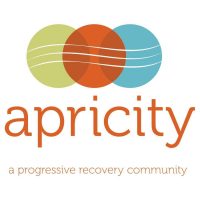
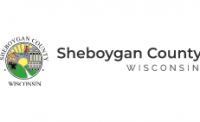
The facility name, logo and brand are the property and registered trademarks of Diocese of Green Bay, and are being used for identification and informational purposes only. Use of these names, logos and brands shall not imply endorsement. RehabNow.org is not affiliated with or sponsored by Diocese of Green Bay.

